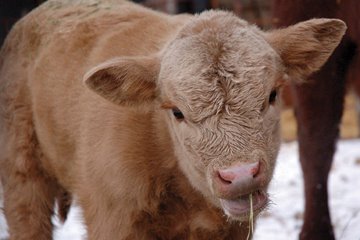
by Karen Emilson
The pressure is on Manitoba Member of Parliament, James Bezan, to deliver on his government’s promise that the new Growing Forward programs introduced last fall, will provide financial assistance to farmers in crisis.
Bezan represents the Selkirk-Interlake riding and is Chairman of the Standing Committee for Agriculture and Agri-Food. A cattle producer from Teulon, and the former Executive Director with the MCPA, he understands the pressure cattle producers feel when faced with a feed shortage. He represents a large contingent of farmers hit hard this year by unprecedented summer rains.
Bezan was in Ashern August 30, and said that right now most of his attention is focused on trying to set the groundwork to petition for financial assistance for those whose crops have been ruined - and for cattle producers who will have to purchase feed or sell cows.
“I’m asking for tax deferral for the guys who do decide to liquidate or downsize this fall, but right now, the way the regulation is written, it only provides the Minister with that power in case of drought. So we have to re-do the regulations to include flood. It’s a process that involves a few levels of government so it might take awhile, ” he said. “My understanding is that if this isn’t finalized before the end of the year, it will be retroactive to 2008.”
He says that once the election is called and parliament dissolves, government’s hands will be tied except in cases of extreme emergency.
“We’re also looking at AgriRecovery to help with either a per head or per acre payment. This past week there were people from Ag Canada who came out and surveyed the area and talked to local MAFRI staff. They had a face-to-face meeting with the province at the end of the week.”
He explained that AgriRecovery is a stand-alone program to get cash into the hands of farmers who need it during a disaster situation. Enrollment in any of the Growing Forward programs introduced last fall, (AgriStability, AgriInsure (crop insurance) or AgriInvest), will help a producer qualify.
Bezan said one of the major stumbling blocks is that there are producers in the affected areas who made the decision to not buy crop insurance this year. He says it is always tough for the government to decide where their responsibility begins and ends when it comes to the producer’s management decisions.
He is arguing that the cattle market has been so bad for so long that guys have had to cut corners in order to pay bills and make their payments.
“I’ve told Ag Canada, the Minister’s office and Minister Ritz that the argument producers should have hay insurance is unfair, especially during these cost-cutting times. It’s hard to invest in something they believe isn’t going to work,” he said.
He stresses that while the media focus has been on the Interlake, farmers in other parts of the province who have seen extreme moisture, and those living in the drought-stricken southwest, will also qualify for the program if it becomes available.
Bezan is also trying to address producer concerns about drainage, and while more drains are not necessarily needed, maintenance and upgrading of the ones that are there would help in some instances. He has been discussing the situation with the Department of Fisheries and Oceans (DFO) asking them to escalate drainage projects in the area, and to see what else can be done to alleviate the problem.
“With the way Water Stewardship and DFO works, Municipalities have to get a permit and to do so, have to work through two levels of bureaucracy. I’m asking that if in extreme situations they need to cut through roads to get the water moving, and fill them in later, let them do it without a permit.”
He is also suggesting that if producers who receive an excess moisture payment through Crop Insurance, that they still be eligible for an AgriRecovery payment that could cover some of the lost input costs, like fertilizer, on grain or hay land.
“Hopefully AgriRecovery will help balance some of that off,” he said, adding that Minister Ritz will make the final decision after discussions with the province.
Bezan says he hates the thought that cattlemen may be forced to down size their cow herd right now, just as prices are starting to climb. Many have held onto cows and kept back heifers with the hopes of capitalizing on the upward trend they knew was coming.
“They did the right thing,” he said. “They’ve maintained their herd or expanded during the low price cycle and have been riding it out. For this to happen now is devastating.”
He explained the federal government’s ability to announce a program before depends on reaching agreement with the province. He said now is not the time to be playing politics.
“You don’t play with people’s livelihoods. This is where partisanship has to be set aside,” he said. “This is about doing the right thing.”
Bezan said he doesn’t want to raise false hopes but wants producers to know he is working on it.
“My personal opinion is that AgriRecovery has to work quick and provide results to mitigate cash flow difficulties,” he said. “Hopefully we will have an answer soon.”


No comments:
Post a Comment